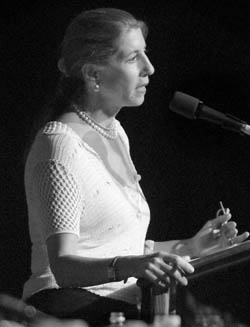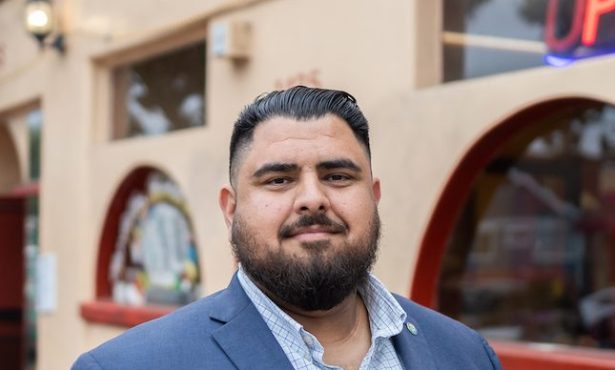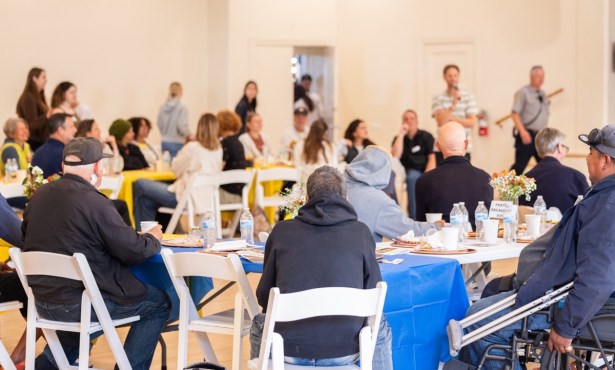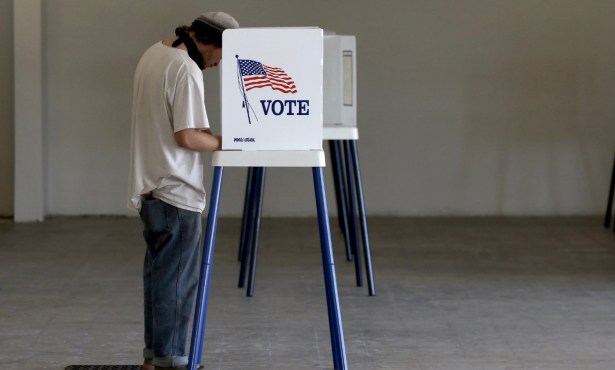A Watchdog, Not a Lapdog
Annie Bardach stands tall against Alberto Gonzales's assault on journalism
ANNIE GET YOUR GUN: When the phone rings in our house after 10 p.m., it means one of two things: Either somebody just died or Annie Bardach is on the horn. Annie tends to call from places like Miami, where she’s dredging up some of the nastiest political corruption practiced anywhere in the Western Hemisphere. As a reporter, Bardach is famous for her tick-like tenacity, which has landed her not one, but two interviews with Fidel Castro and one-on-ones with a host of other high-profile also-rans. Her work has appeared in almost every media outlet under the sun-Vanity Fair, Salon, the Washington Post, and the New York Times to name a few.

In relations with fellow reporters, Bardach manages to be both ferociously territorial and impulsively generous. Typically, her late-night salutations are inspired by some hot tip she just has to share. Often, though not always, it involves the increasingly expensive shenanigans of the Water Board in Carpinteria-where she’s lived since 1989-which Bardach has taken to tormenting in her limited spare time. In recent months, however, Annie’s calls have grown fewer and further in between. Sometime early this spring, she began nursing a stubborn summer cold, which promises to hang on well into the fall or whenever Annie’s little-known court battle with Attorney General Alberto Gonzales plays itself out.
This showdown exposes America’s glimmering double standard when it comes to waging our fabled war on terror against terrorists we have trained and supported through the years. It also puts in peril one of the most important-if abused and misused-protections reporters in this country still sort of have: the legal ability to protect one’s sources.
In October 2006, Gonzales signed the paperwork necessary for a federal Grand Jury operating out of Newark, New Jersey, to subpoena any and all information Bardach may have collected while preparing for a story she wrote for the New York Times in 1998 about Luis Posada Carriles, a charismatic anti-Castro militant linked not just to the CIA-for whom he worked many years-but to the bombing of a Cuban jetliner in 1976 that blew the 73 passengers-all civilians-out of the sky. For the record, Posada denies all responsibility. But according to recently declassified government documents, FBI investigators at the time strongly believed otherwise. It doesn’t help Posada’s case that the two men arrested for physically planting that bomb happened to be his employees at the time or that government informants insist he’d met with them twice just prior to the bombing to discuss its details.
The October subpoena marks the second such swoop the Feds have made on Bardach’s notes in as many years. In 2005, the Department of Homeland Security subpoenaed both Bardach and the New York Times, but retreated after her lawyer-hotshot First Amendment attorney Tom Julin-challenged its legal grounds for doing so. A gag order prevents Bardach from discussing any details of the current case, but in the first go-around, the Feds wanted the tapes of Bardach’s interviews with Posada as well as any notes and documents. Those tapes and notes provided the basis for three articles she wrote for the New York Times in which Posada admitted he bombed a series of Havana nightclubs to chase out the foreign tourists-and all their money. Posada had been miffed that his reign of terror-which killed one tourist and wounded several others-had not received the coverage he thought it warranted and contacted Bardach to set the record straight. The other bombshell Posada let loose in his interview with Bardach was the extent to which he and his explosive schemes had been funded through the years by wealthy, politically connected, passionately conservative Castro-hating Cubans living in Florida.
In part, what makes this case so excruciating for the U.S. government is Posada’s long and loyal service to Uncle Sam. It was the U.S military that first trained Posada in the art of demolition, sabotage, and propaganda back in the early 1960s. His resume includes being part of a squad prepared to invade Cuba during the unsuccessful Bay of Pigs Invasion, serving a stint in the U.S. Army, working briefly for Bridgestone/Firestone tire company in Akron, Ohio, and then being on the CIA payroll until the early ’70s. In official documents, Posada’s name always turns up accompanied by breathless descriptions of all the explosive devices he had in his possession. But the CIA cut Posada loose after he got too chummy with the Miami Mob, selling the local Mafia boss the sort of bombs and weapons that should have been reserved for clandestine military operations. Then came the airliner bombing in ’76, a stint in a Venezuelan prison for that bombing, and his escape in 1985.
No sooner was Posada out of jail than he was back in action, running errands for Lt. Colonel Ollie North in Central America as part of the whole Iran-Contra mess. For those foggy with the details, that scheme was hatched by senior White House officials during the Reagan-Bush administration to illegally sell weapons to Iran (then our declared enemy) and use the proceeds to secretly fund-also against the law-a band of Nicaraguan counter-revolutionaries (the Contras) then at war with that nation’s socialist-and democratic-government. Such subterfuge proved “necessary” because Congress had passed a law, the Boland Amendment, which denied American military aid to the contras.
In issuing the first subpoena, the Feds claimed they needed to raid Annie’s cookie jar to stop Posada-who had snuck into the United States in 2005 using a fake passport-from obtaining the political asylum he was seeking. He claimed he would face certain persecution if he were returned to the Venezuelan prison. The United States was in a quandary. If the Feds charged Posada with crimes of terror-which would have been consistent with our global-war-on-terror rhetoric-he would have exposed the extent to which his many acts of political violence had been undertaken with U.S. connivance, support, or outright direction. But if the United States did nothing, it would expose the war on terror as a total sham. Given these choices, the federal government chose to go after Posada on a technicality and charged him with a handful of immigration violations. That didn’t work. On May 8, 2007, a Texas judge tossed the government’s immigration case out on its ass, accusing the prosecution of engaging in “fraud, deceit, and trickery.” That ruling is a story unto itself, but the effect was to hand Posada, now 79, a get-out-jail-free card.
It was during this trial that the Newark Grand Jury issued the second federal subpoena on Bardach, coincidentally on the anniversary of the Cuban airliner bombing. The government’s stated case-which it is not anxious to publicize-is that Bardach’s material is the only thing standing between a mad bomber and his freedom. Bardach isn’t buying it. In the first place, she argued, it’s bad business for reporters to be regarded as government snitches. It’s bad for everyone else, too. If potential sources with vital information about abuse of government power are afraid that reporters might have to turn them in, who’s going to talk? Already, most readers regard the media as “a lapdog, not a watchdog,” Bardach argued in legal papers filed against her first subpoena. No good can come from making a bad situation worse.
She also contends the government already has more than enough information to nail Posada to the wall. To prevail in court, the government must demonstrate Bardach has information central to its case and that this information cannot be obtained anywhere else. But she and her attorney point out that the government has 45 years of FBI and CIA field notes on Posada, eight hours of taped interviews conducted by the government in the course of its immigration investigation, taped conversations turned over to the FBI by the Cuban government, and a host of detailed and incriminating government documents recently released by the National Security Archive.
And then there’s Bardach’s favorite: Until 2003, the FBI’s Miami bureau maintained an ongoing investigation on Posada, who reportedly slipped in and out of town at will. But that year, the U.S. Attorney in Miami-a prominent Cuban-American named Marcos Jimenez-mysteriously declared the Posada case closed, and ordered five boxes of documents destroyed. Jimenez explained it was a routine house-cleaning procedure, but since when do law enforcement agencies abandon investigations of people who boast to reporters-as Posada did to Bardach in 1998-of his recent bombing exploits? In that interview, Posada acknowledged with some regret how, on occasion, innocent bystanders got killed, but then added, “I sleep like a baby.”
Presumably, the FBI files might have contained incriminating information detailing the support Posada had received from Miami’s politically connected Cuban crowd. It’s worth noting that Jimenez’s brother Frank served three-and-a-half years as legal advisor to Florida Governor Jeb Bush. And George W. Bush himself recognized this service-and everything the Jimenez brothers might have done to ensure he won Florida’s now infamous presidential recount in 2000-by appointing Frank to a high-level post at HUD (Housing and Urban Development). Of all her exploits, Bardach is most proud of exposing the destruction of the FBI’s case files on Posada. And most angry. “You don’t get to destroy your own documents and then come after mine,” she declared. “It doesn’t work that way.”
Bardach’s attorney Tom Julin speculated the Feds are going after Bardach precisely because they know she’ll put up a fight. As he sees it, the Feds can’t afford to go after Posada because of what he knows and what he might say. But because of the administration’s so-called war on terror, the Feds can’t afford to give him a pass either. The best solution, he said, is to orchestrate an impasse. “What better way to gum up the works,” he asked, “than to create a controversy with a reporter over sources?”
For the moment, Bardach is taking delight in Alberto Gonzales’s political meltdown. “He seems a little indisposed right now,” she said with a hearty chuckle. She’s also been invited to testify before one of the many Congressional panels the new Democratic majority is using to investigate, embarrass, and harass the Bush administration. At some point, she’s expected to detail what she knows about Posada and how his FBI files so conveniently came to be destroyed. In the meantime, Bardach is raising hell about the hellaciously high water rates charged by the Carpinteria Valley Water District. And she’s still nursing that summer cold she picked up this spring.
In the meantime, when the phone rings in your house late at night, ask not for whom the bell tolls; pick it up and say hi. It’s probably Annie Bardach with a hot tip.



